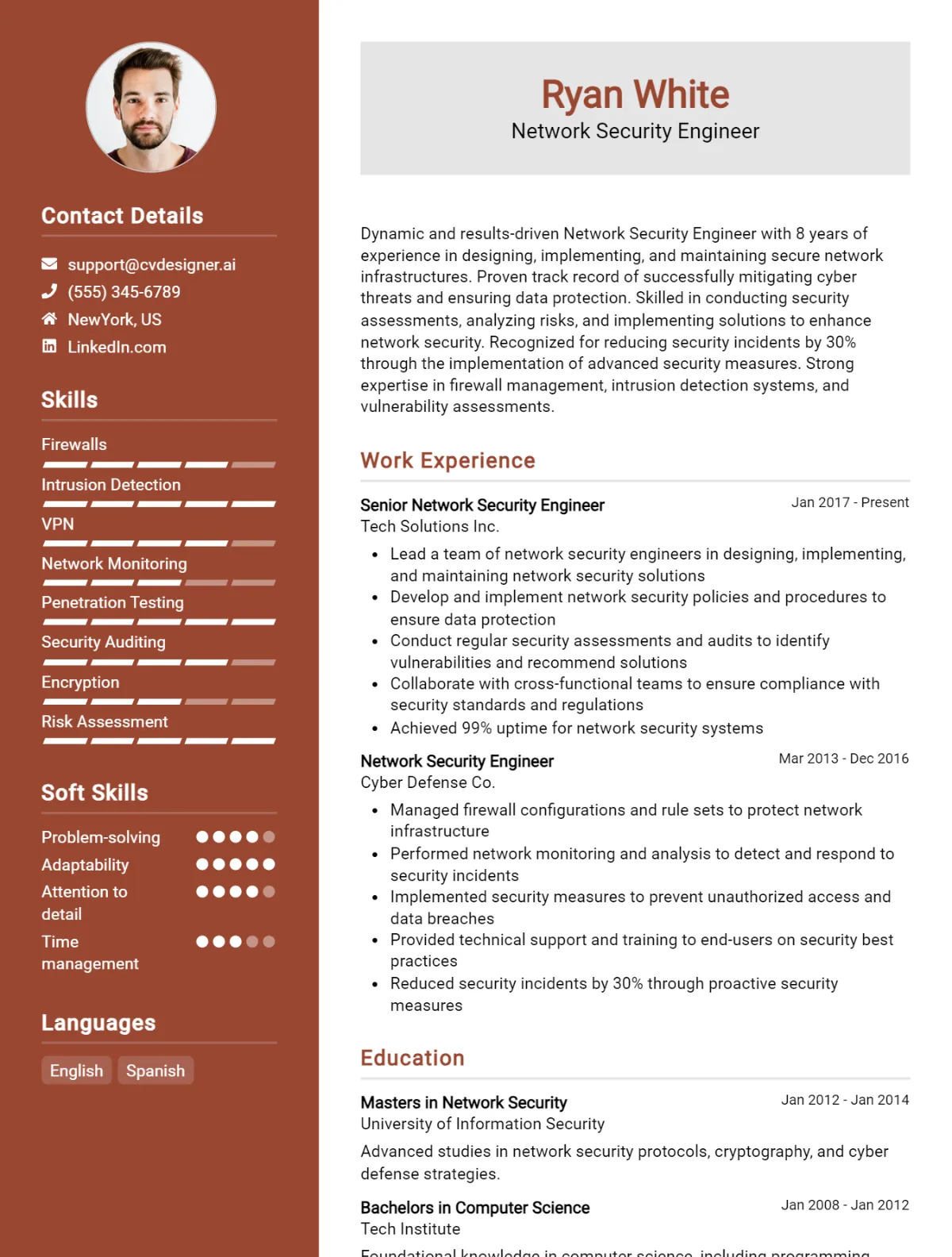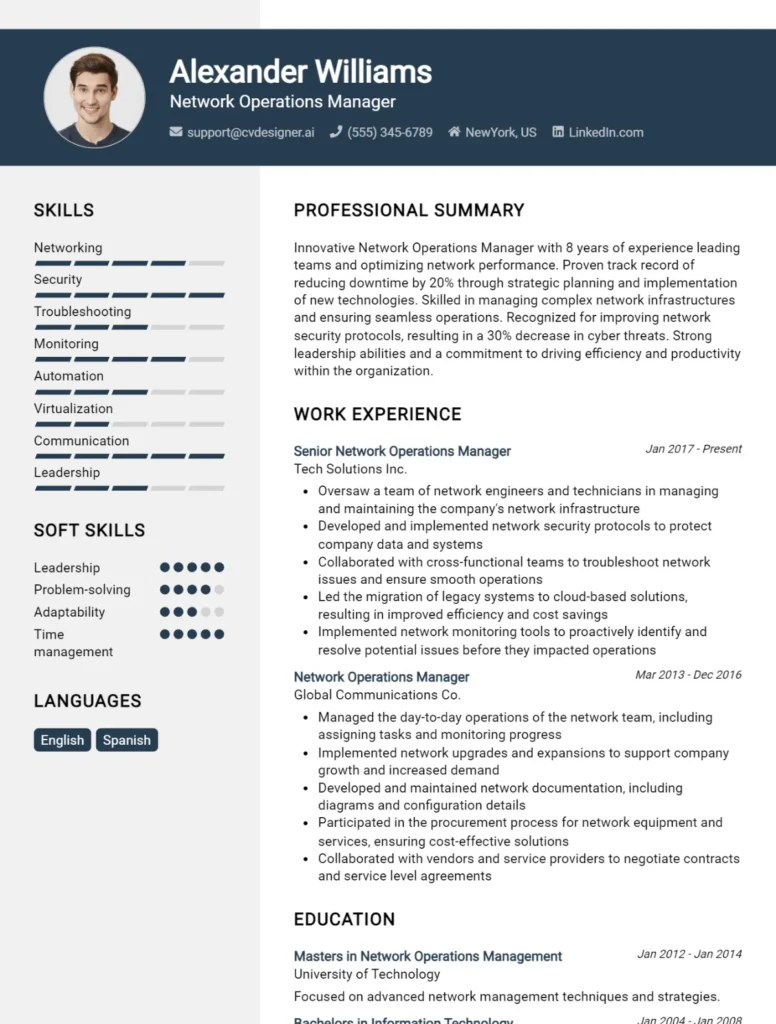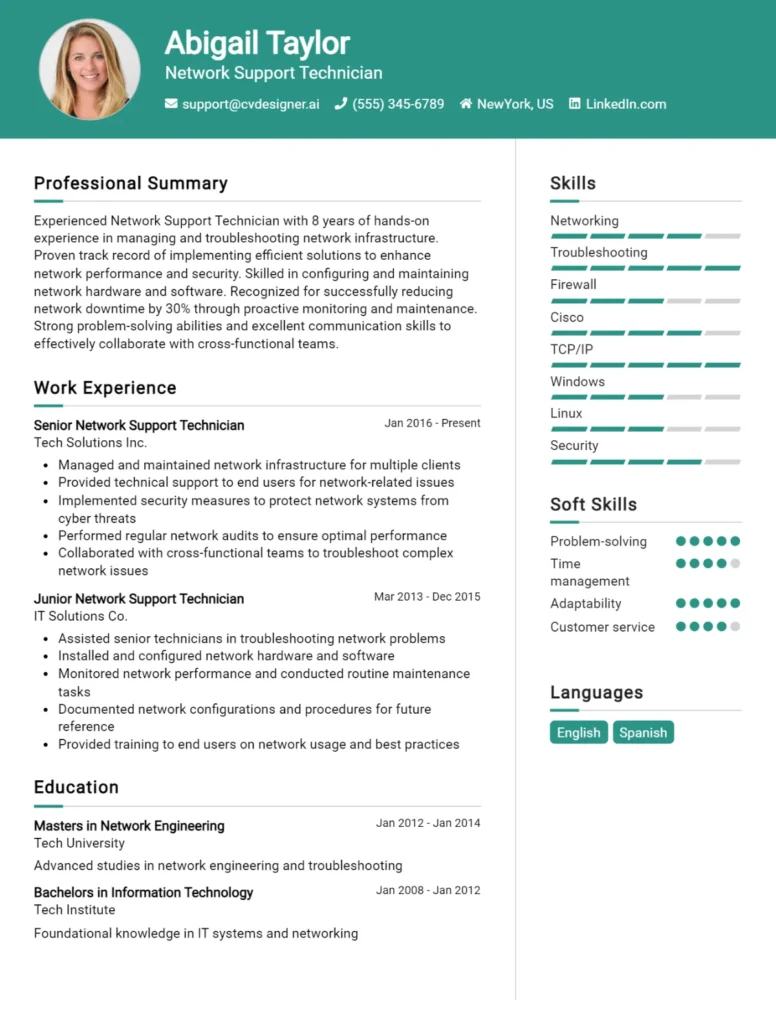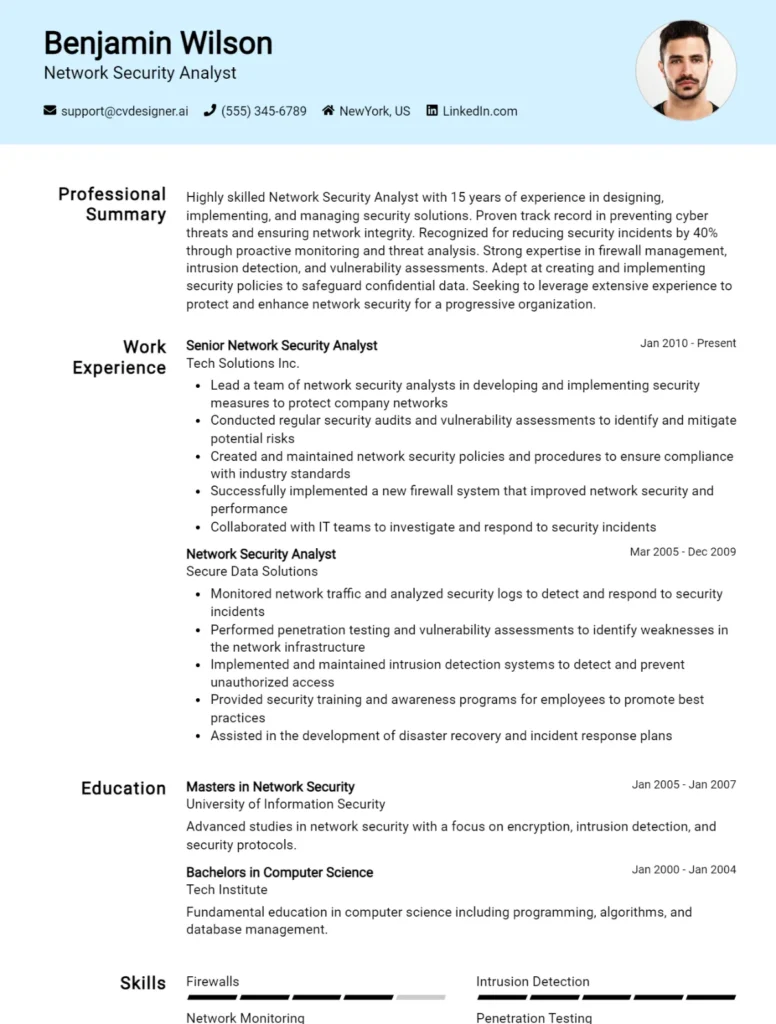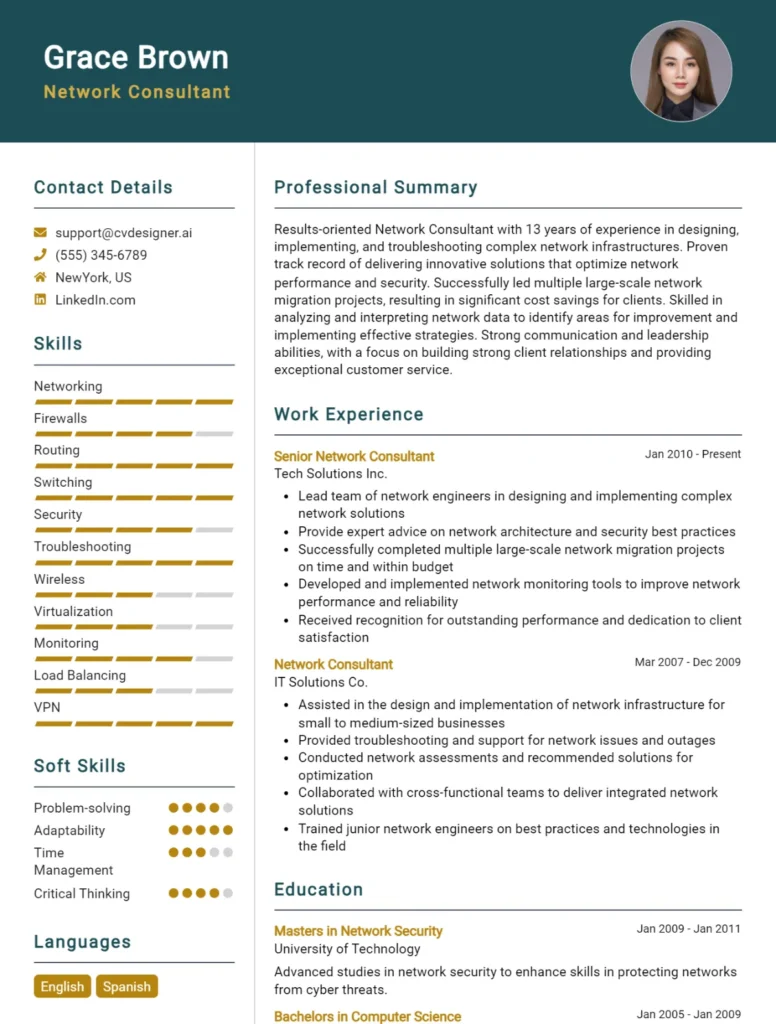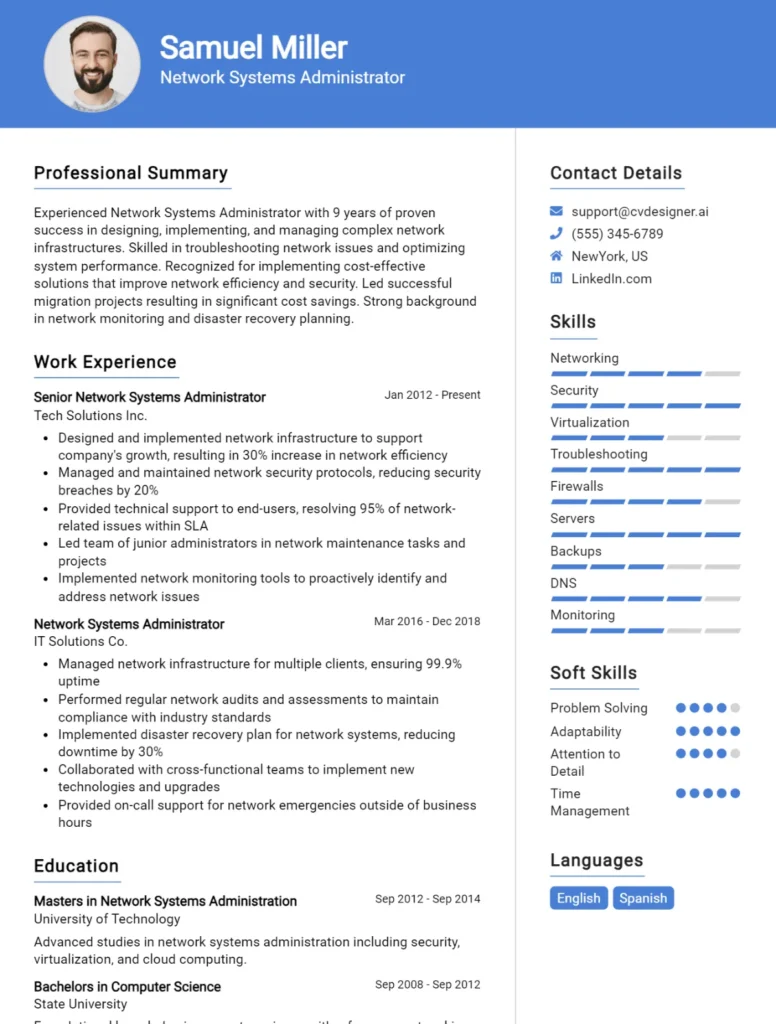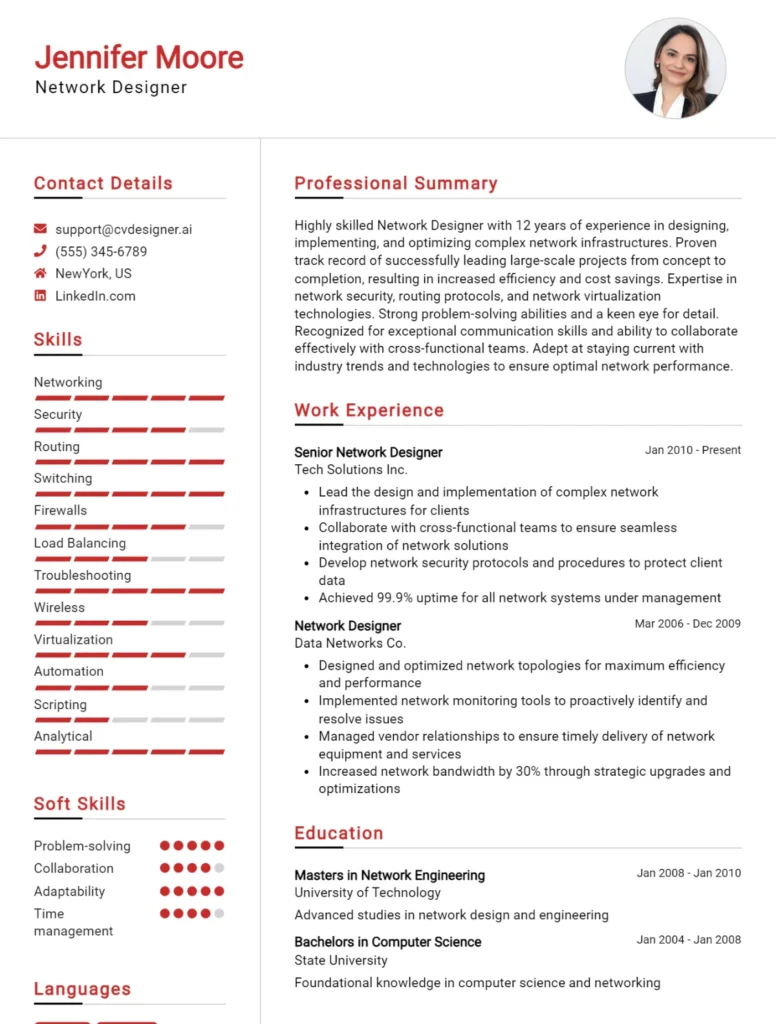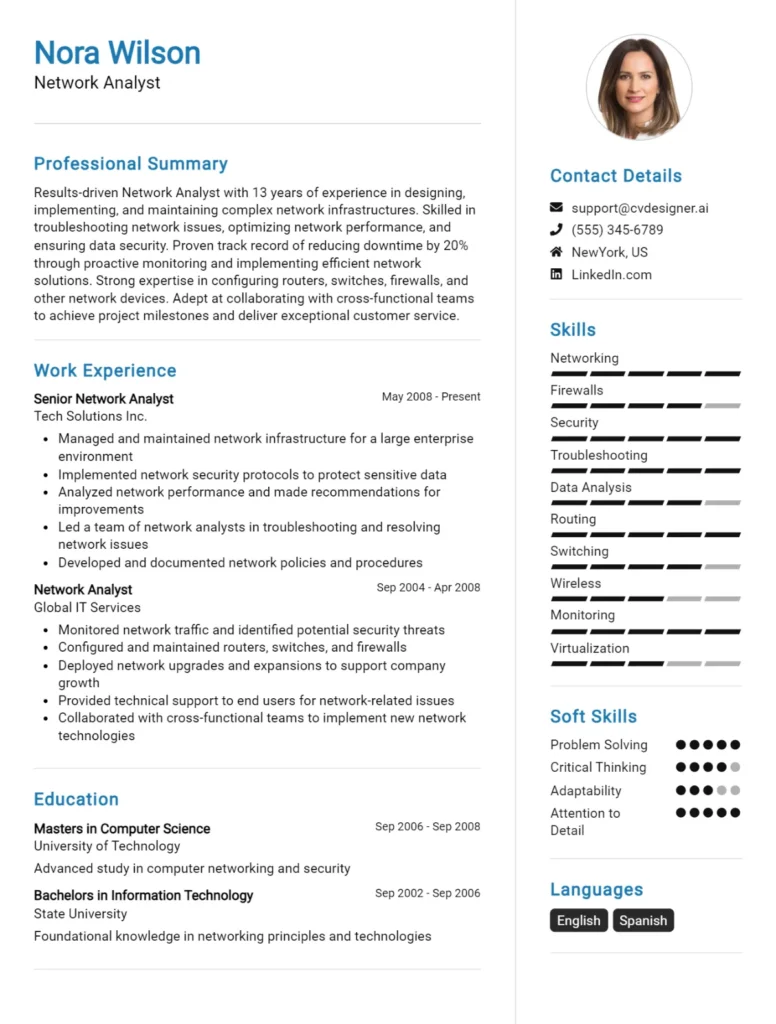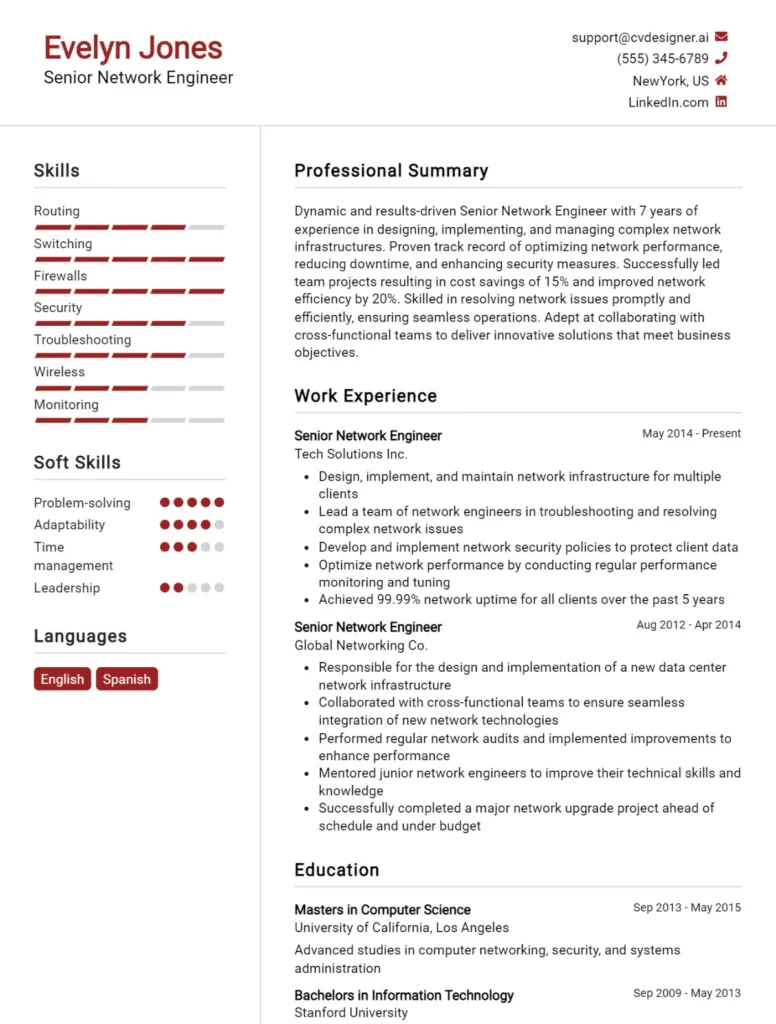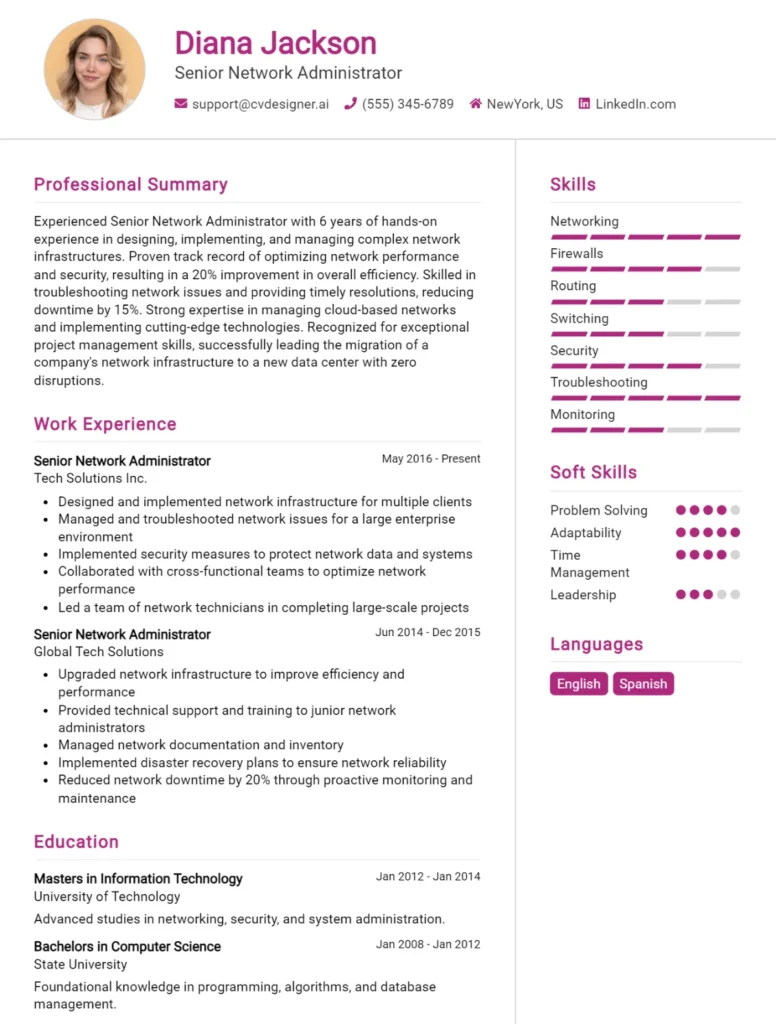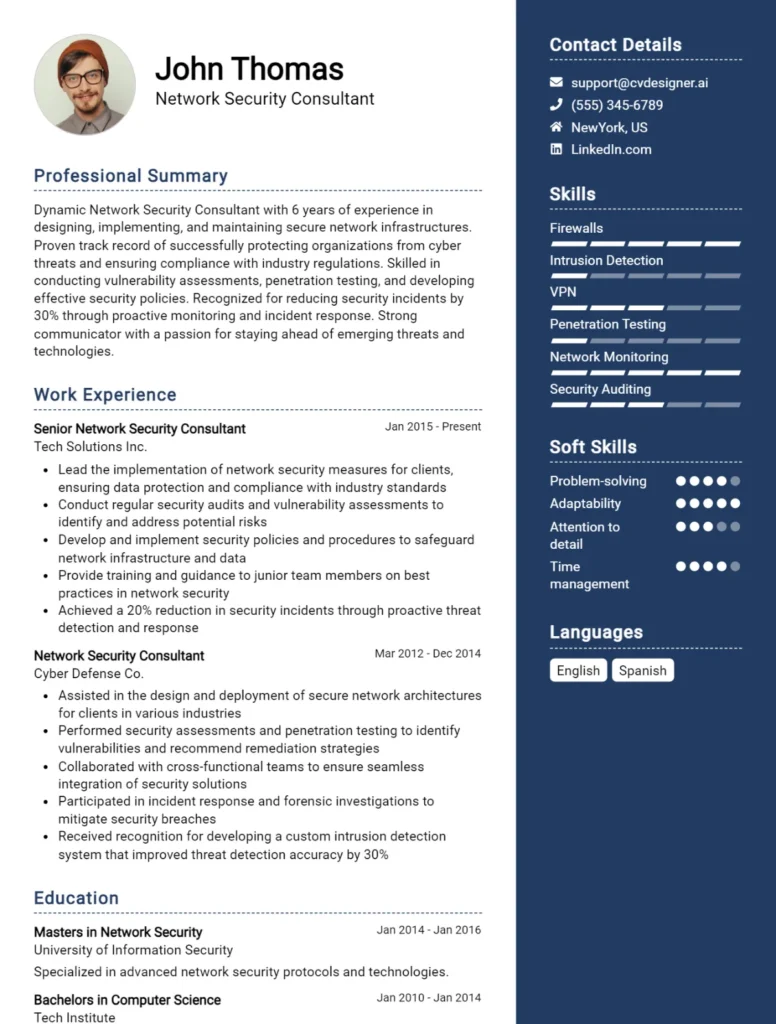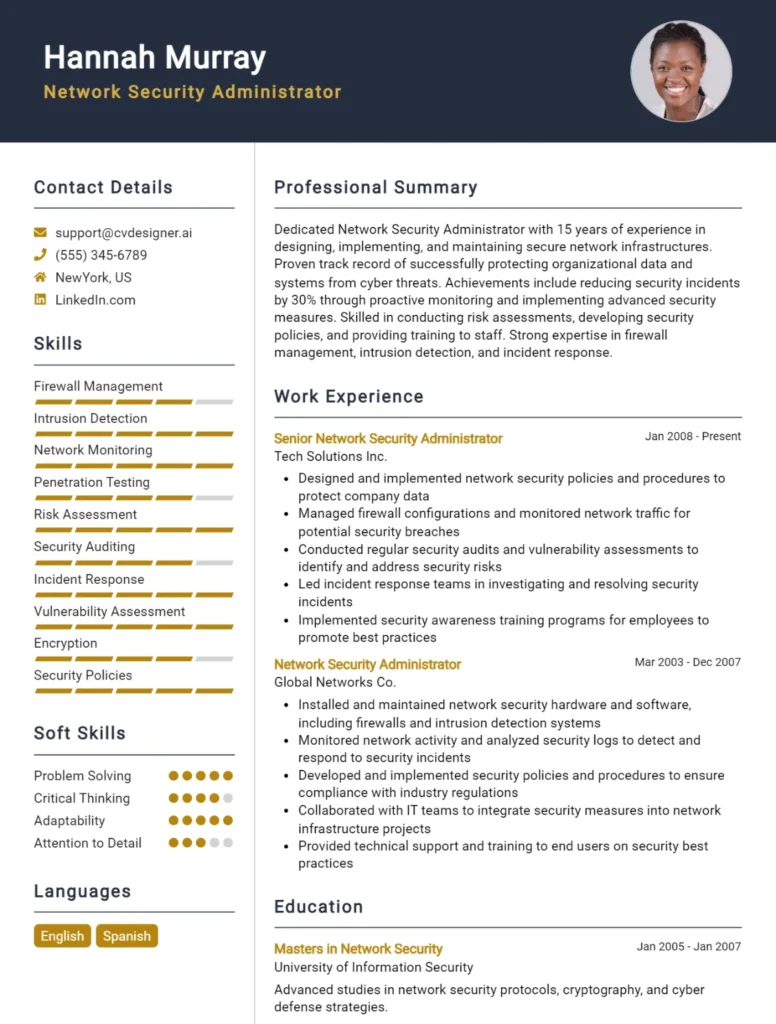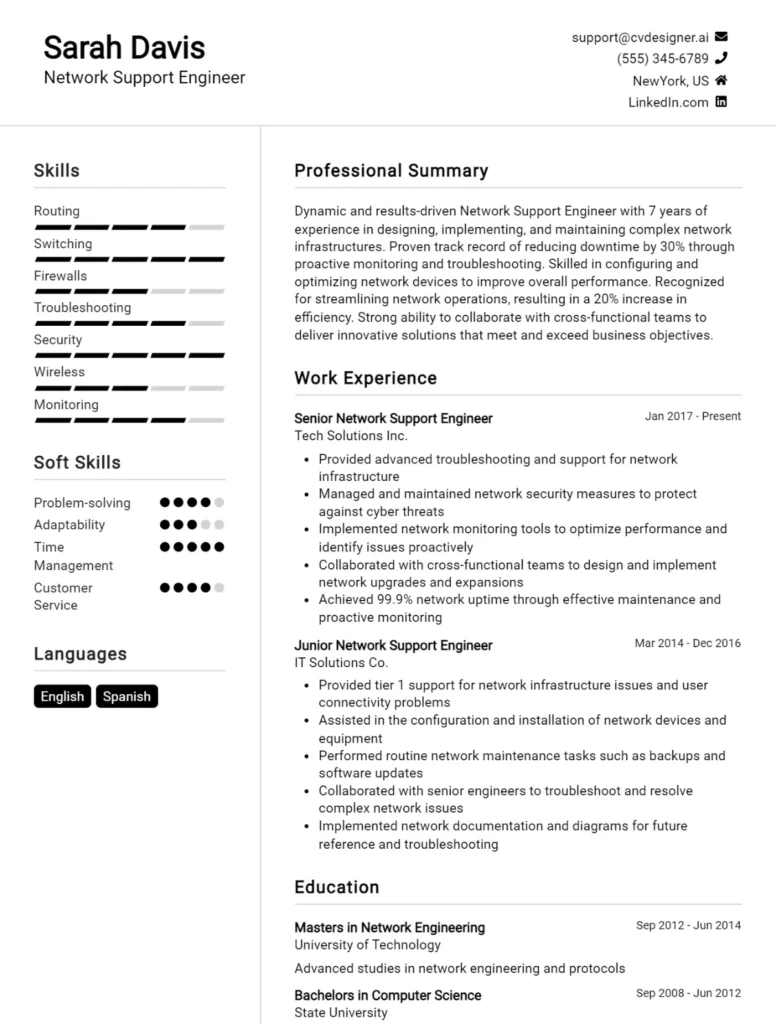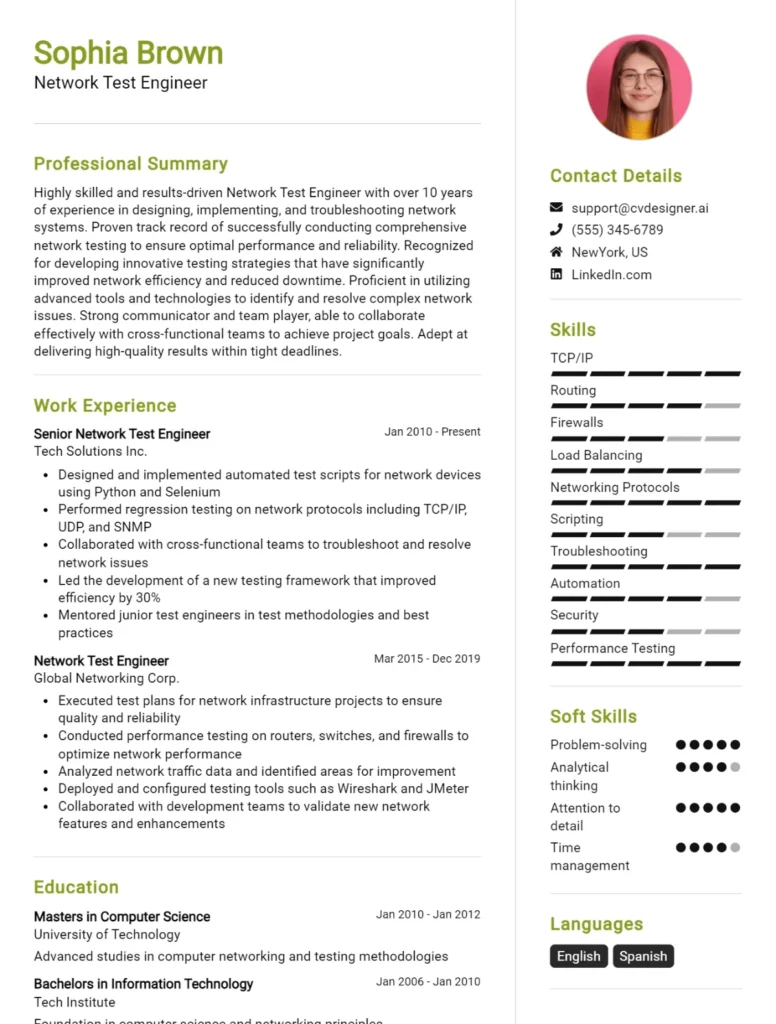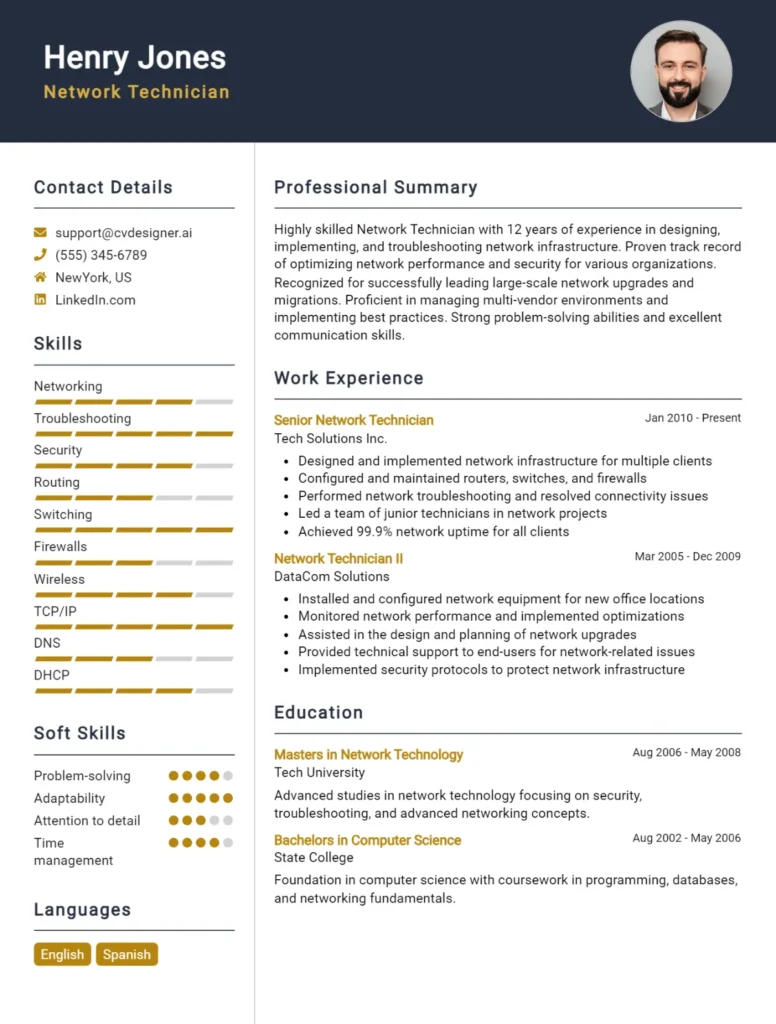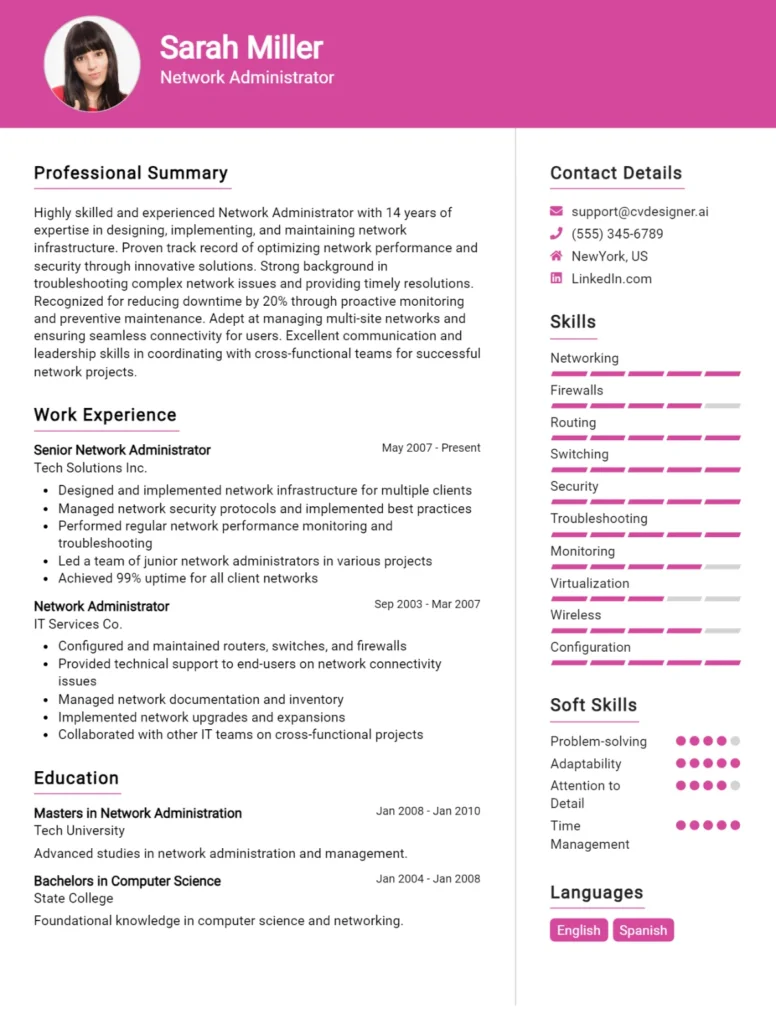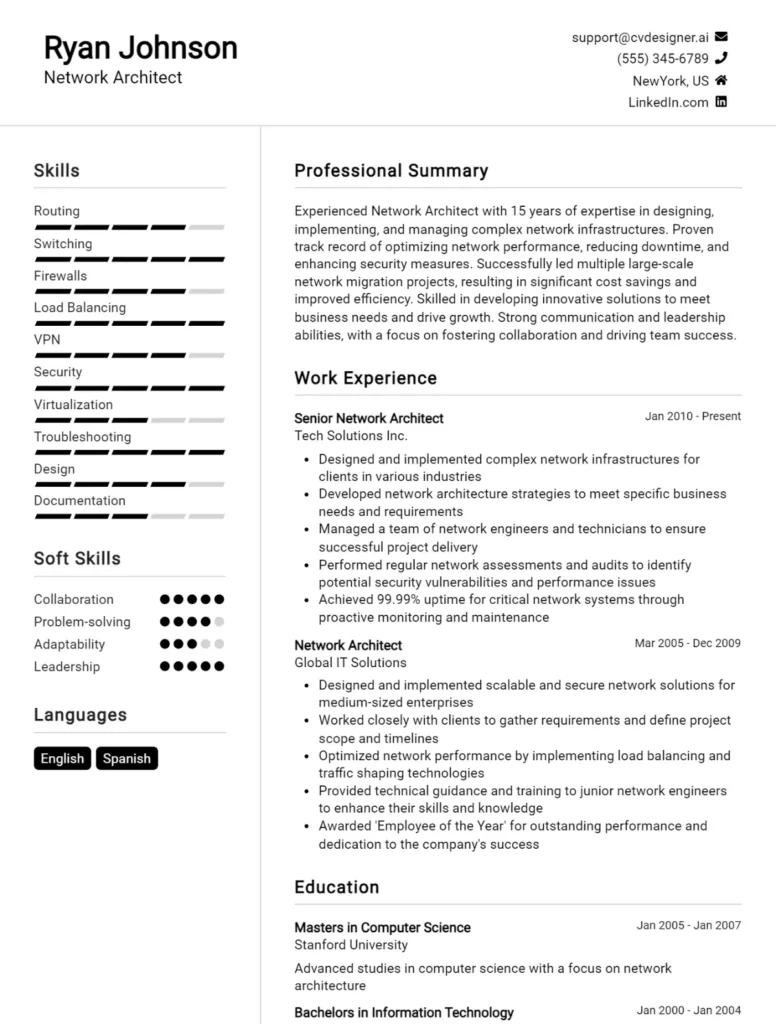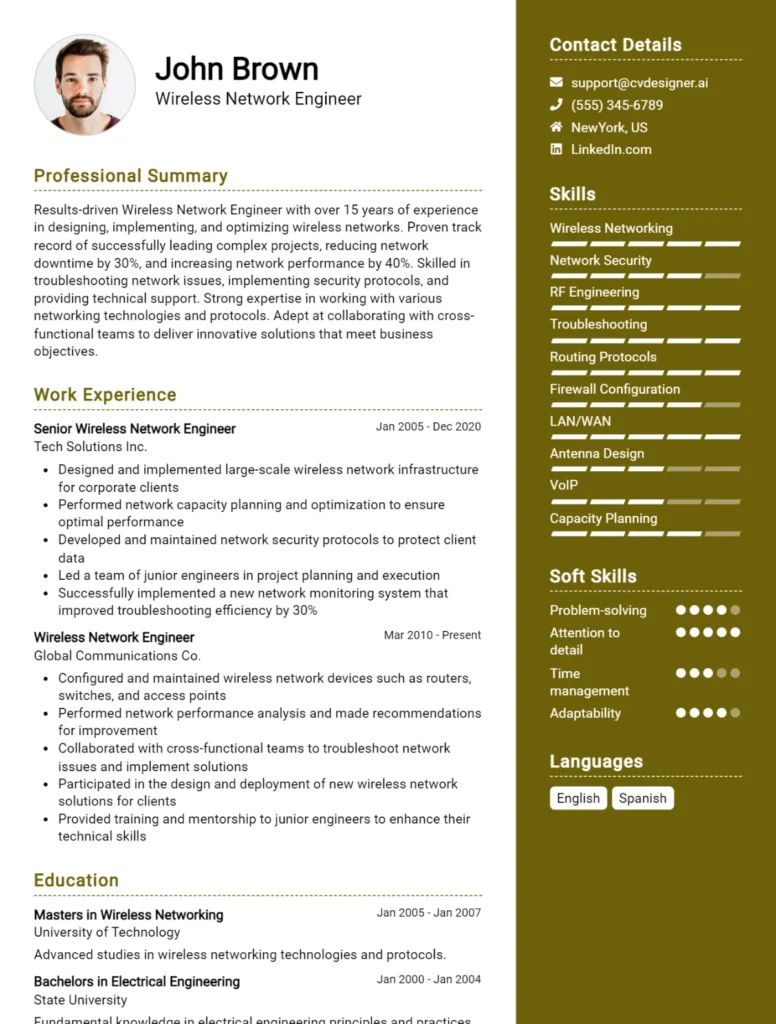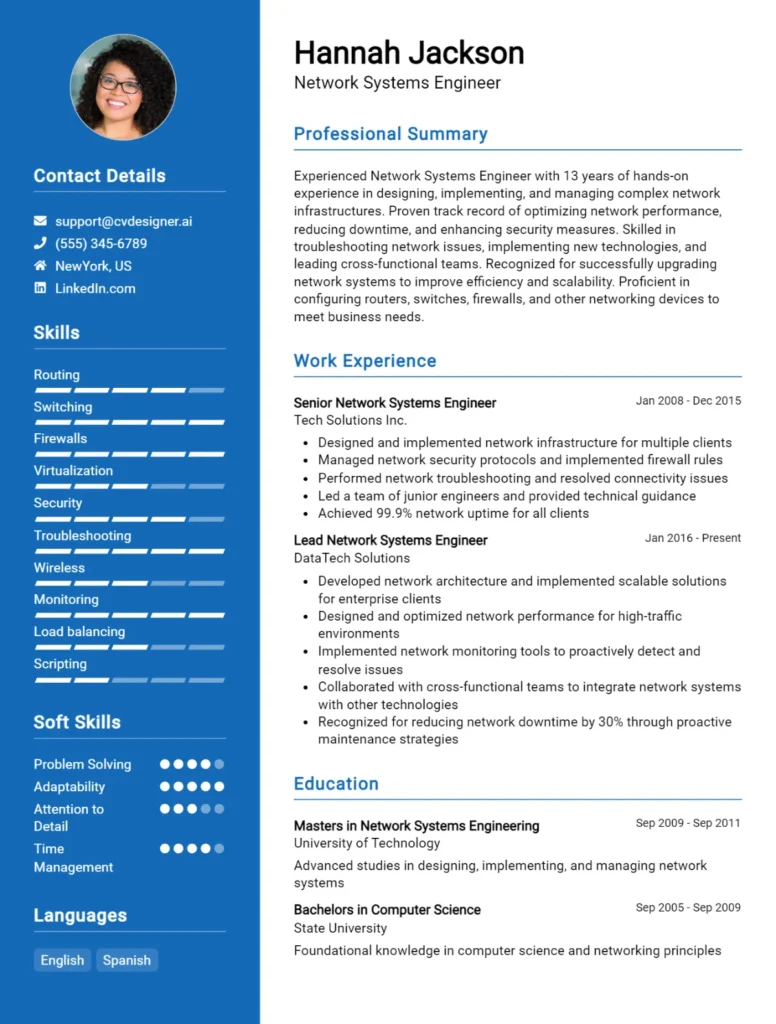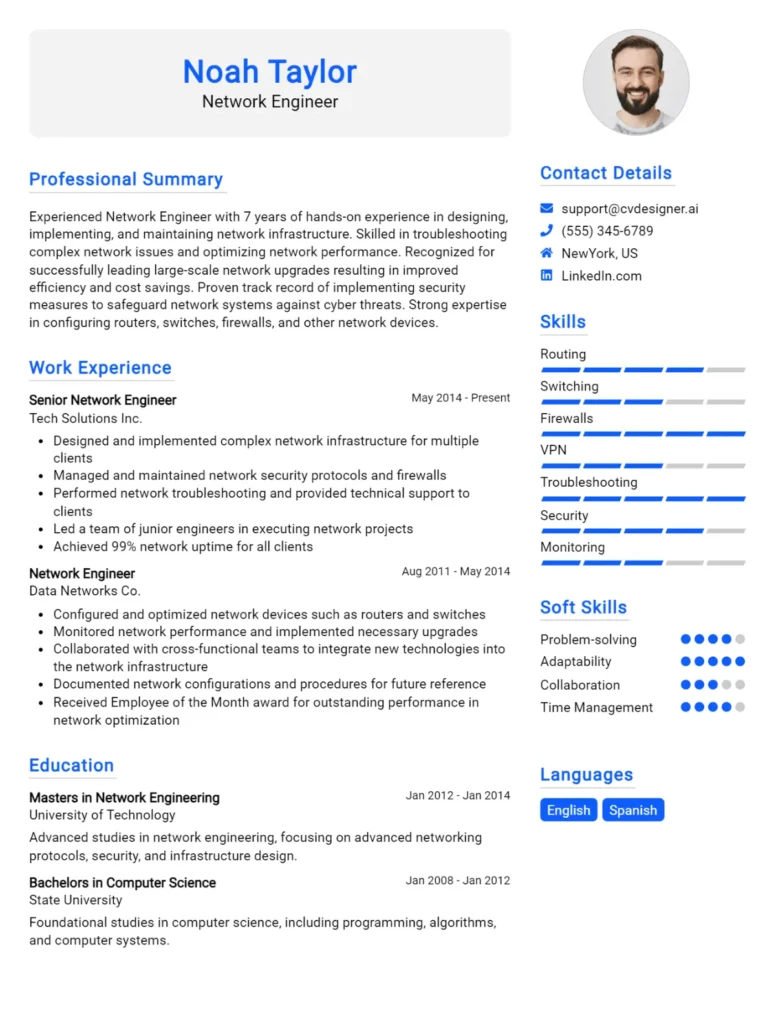Most Popular Network Security Engineer CV Examples
Explore additional Network Security Engineer CV samples and guides and see what works for your level of experience or role.
As the digital landscape continues to evolve, the demand for skilled Network Security Engineers has never been higher. Crafting a standout CV is essential for showcasing your technical expertise and making a lasting impression on potential employers. In this comprehensive guide, we'll walk you through the critical elements of writing an effective CV tailored specifically for Network Security Engineers. You'll learn how to highlight your skills, experiences, and certifications in a way that aligns with industry standards. By the end of this article, you'll be equipped to create a compelling CV that sets you apart in a competitive job market. Here’s what we’ll cover:
- Key components of a Network Security Engineer CV
- Tips for showcasing technical skills and certifications
- Strategies for describing your professional experience
- The importance of tailoring your CV for specific job applications
- Common mistakes to avoid in CV writing
- An example CV to provide a practical reference
Dive in to transform your CV into a powerful career tool that opens doors to new opportunities!
What is a Network Security Engineer CV?
A Network Security Engineer CV is a crucial document that showcases an individual's skills, experience, and qualifications in the field of network security. This specialized CV highlights technical proficiencies such as knowledge of firewalls, intrusion detection systems, and encryption protocols, as well as certifications like CISSP or CEH. A well-crafted CV not only presents a candidate's professional background but also demonstrates their ability to safeguard an organization's digital assets, making it essential for standing out in a competitive job market. For further guidance on creating an impactful CV, you can refer to our comprehensive cv writing guide.
In addition to detailing work experience and educational background, a Network Security Engineer CV should effectively communicate the candidate's problem-solving abilities and familiarity with the latest security technologies. This is important because hiring managers seek professionals who can proactively address vulnerabilities and ensure the integrity of their systems. Utilizing a cv maker can streamline the process, allowing candidates to design a visually appealing and tailored CV that aligns with industry standards. Ultimately, a strong CV serves as a powerful marketing tool, helping Network Security Engineers to secure interviews and advance their careers.
Key Components of a Network Security Engineer CV
- Contact Information: Include your full name, phone number, email address, and LinkedIn profile to ensure potential employers can easily reach you.
- Professional Summary: Write a brief overview of your experience, highlighting your expertise in network security and your career objectives.
- Technical Skills: Highlight relevant skills such as firewall management, intrusion detection systems, VPN configuration, and knowledge of security protocols. For a comprehensive list, refer to these skills.
- Certifications: List any pertinent certifications such as CISSP, CISM, CEH, or CompTIA Security+ that validate your knowledge and skills in network security.
- Work Experience: Detail your previous roles, focusing on responsibilities and achievements related to network security. Use the work experience section to enhance this part of your CV.
- Education: Include your degree(s) in relevant fields such as Information Technology, Computer Science, or Cybersecurity, along with the institutions and graduation years.
- Projects: Describe significant projects you've worked on, emphasizing your role and the impact of the project on the organization’s security posture.
- Technical Proficiencies: Mention specific tools and technologies you've worked with, such as firewalls (e.g., Cisco ASA, Fortinet), SIEM systems, and network monitoring tools.
- Soft Skills: Highlight essential soft skills such as problem-solving, attention to detail, communication, and teamwork, which are critical in a network security role.
- Professional Affiliations: List memberships in professional organizations, such as ISACA or (ISC)², which demonstrate your commitment to the field.
- Awards and Recognition: Include any relevant awards or recognition you've received for your work in network security to showcase your accomplishments.
- References: Optionally, state that references are available upon request, or include professional references who can vouch for your skills and experience.
Sample Network Security Engineer CV for Inspiration
John Doe
123 Cyber Lane
Tech City, CA 12345
(123) 456-7890
john.doe@email.com
LinkedIn: linkedin.com/in/johndoe
Professional Summary
Dedicated and detail-oriented Network Security Engineer with over 7 years of experience in safeguarding organizational data and infrastructure. Proven expertise in designing secure networks, conducting risk assessments, and implementing cutting-edge security solutions. Strong background in threat detection and response, coupled with a commitment to continuous learning and staying ahead of emerging security trends.
Work Experience
Network Security Engineer
XYZ Technologies, Tech City, CA
June 2018 - Present
- Designed and implemented security policies, protocols, and procedures to protect sensitive information and ensure compliance with industry regulations.
- Conducted regular security assessments and vulnerability scanning, identifying and mitigating potential risks and threats.
- Collaborated with IT teams to deploy intrusion detection and prevention systems (IDPS) to monitor network traffic for suspicious activity.
- Developed incident response plans and led training sessions for staff on best practices for network security.
- Implemented multi-factor authentication (MFA) and encryption protocols to enhance data protection.
Junior Network Security Engineer
ABC Solutions, Tech City, CA
August 2015 - May 2018
- Assisted in the monitoring and management of network security tools, including firewalls, VPNs, and antivirus software.
- Participated in the analysis of security incidents and provided recommendations for remediation.
- Supported the implementation of security patches and updates across network devices and systems.
- Conducted internal audits to ensure compliance with security policies and standards.
Education
Bachelor of Science in Computer Science
University of Technology, Tech City, CA
Graduated: May 2015
Skills
- Network Security Principles
- Firewalls and VPN Technologies
- Intrusion Detection and Prevention Systems (IDPS)
- Risk Assessment and Management
- Vulnerability Scanning and Penetration Testing
- Incident Response and Forensics
- Security Information and Event Management (SIEM)
- Multi-factor Authentication (MFA)
- Scripting and Automation (Python, Bash)
- Strong Analytical and Problem-Solving Skills
Publications
- Doe, J. (2022). "The Evolution of Network Security: Trends and Challenges." Journal of Cybersecurity Research.
- Doe, J. (2021). "Implementing Zero Trust Architecture in Enterprises." International Conference on Cybersecurity.
Certifications
- Certified Information Systems Security Professional (CISSP)
- Cisco Certified Network Associate Security (CCNA Security)
- CompTIA Security+
- Certified Ethical Hacker (CEH)
- Certified Information Security Manager (CISM)
References available upon request.
Network Security Engineer CV Writing Tips
When crafting a CV for a Network Security Engineer position, it's essential to highlight both your technical expertise and problem-solving abilities in the face of evolving security threats. Begin with a strong summary that encapsulates your experience and skills related to network security, showcasing your understanding of firewalls, intrusion detection systems, and threat analysis. Use clear, concise language and prioritize relevant experiences that demonstrate your ability to protect an organization’s digital infrastructure. Tailor your CV to align with the specific requirements of the job description, ensuring you include key certifications and technical proficiencies that set you apart from other candidates.
- Customize Your CV: Tailor your CV for each job application, emphasizing the skills and experiences that are most relevant to the specific role.
- Highlight Technical Skills: Clearly list your technical skills, including knowledge of firewalls, VPNs, IDS/IPS, and security protocols.
- Include Certifications: Mention relevant certifications, such as CISSP, CEH, or CompTIA Security+, as they are highly regarded in the industry.
- Quantify Achievements: Use metrics to demonstrate your impact, such as the percentage reduction in security breaches or successful implementation of security measures.
- Showcase Problem-Solving: Provide examples of challenges you've faced in previous roles and how you resolved them, highlighting your critical thinking and analytical abilities.
- Keep Formatting Clean: Use a clear, professional format that is easy to read. Bullet points can help make your CV more scannable.
- Education and Continuous Learning: Include your educational background and any ongoing training or courses that enhance your knowledge in network security.
- Professional Experience: Focus on your most relevant work experience, detailing your responsibilities and achievements in network security roles.
Network Security Engineer CV Summary Examples
As a Network Security Engineer, a strong CV summary is essential for showcasing your expertise and experience in safeguarding network infrastructures. Here are several effective examples that highlight the key skills and achievements relevant to this role.
Detail-oriented Network Security Engineer with over 6 years of experience in designing, implementing, and managing secure networks. Proven track record of reducing security breaches by 30% through effective risk assessment and mitigation strategies. Proficient in firewall management, intrusion detection systems, and compliance with industry regulations.
Results-driven Network Security Engineer with a strong background in developing robust security architectures for enterprise-level networks. Skilled in conducting vulnerability assessments and penetration testing, leading to a 40% reduction in exploitable weaknesses. Excellent knowledge of various security protocols and threat intelligence.
Dedicated Network Security Engineer with a focus on proactive security measures and incident response. Over 5 years of experience in implementing security solutions that enhance data integrity and confidentiality. Expertise in SSL/TLS, VPN configurations, and endpoint security, backed by industry certifications such as CISSP and CEH.
Innovative Network Security Engineer adept at leveraging advanced security technologies to protect sensitive data and minimize cyber threats. Experienced in managing security projects from conception to implementation, achieving compliance with ISO 27001 standards. Strong analytical skills with a commitment to continuous improvement and staying ahead of emerging threats.
Proficient Network Security Engineer with extensive experience in firewall configuration, threat monitoring, and security audits. Recognized for developing comprehensive security policies that align with organizational goals. Excellent communicator with the ability to collaborate effectively with cross-functional teams to enhance overall security posture.
Build a Strong Experience Section for Your Network Security Engineer CV
As a Network Security Engineer, showcasing your hands-on experience is crucial to demonstrate your expertise in protecting networks from threats and vulnerabilities. Below are examples of strong work experience descriptions that highlight key responsibilities, achievements, and skills relevant to the role.
- Developed and implemented robust security protocols, reducing the organization's vulnerability to external threats by 40% over a one-year period. Conducted regular security audits and vulnerability assessments to identify and mitigate potential risks.
- Managed firewall configurations and optimized rule sets to enhance intrusion detection and prevention capabilities, resulting in a 30% decrease in unauthorized access attempts.
- Collaborated with cross-functional teams to design and deploy a comprehensive network security architecture, ensuring compliance with industry regulations and standards such as ISO 27001 and NIST.
- Led incident response efforts for security breaches, effectively analyzing and containing threats, and implementing corrective measures to prevent future incidents. Documented findings and developed post-incident reports for management review.
- Conducted training sessions for IT staff on best practices in network security, including secure coding techniques and threat awareness, improving overall team knowledge and awareness.
- Implemented multi-factor authentication solutions across the organization, enhancing user access control and significantly reducing the risk of credential theft.
- Utilized advanced security tools such as SIEM systems and intrusion detection systems (IDS) to monitor network traffic for suspicious activities, resulting in timely threat detection and response.
- Participated in the development of disaster recovery and business continuity plans, ensuring that security considerations were integrated into the overall strategy to minimize downtime and data loss in the event of a security incident.
Network Security Engineer CV Education Examples
A strong educational foundation is essential for a Network Security Engineer to effectively design, implement, and manage secure network infrastructures. Here are several relevant educational backgrounds that can help candidates excel in this field:
- Bachelor’s Degree in Computer Science: This program provides a comprehensive understanding of software development, algorithms, and computer systems, laying the groundwork for understanding network architecture and security principles.
- Bachelor’s Degree in Information Technology: Focusing on the practical aspects of technology implementation, this degree covers essential topics such as network administration and information security, essential for a career in network security.
- Bachelor’s Degree in Cybersecurity: Specifically tailored for the cybersecurity domain, this degree delves into protecting networks, systems, and data from cyber threats, making graduates well-equipped for network security roles.
- Master’s Degree in Network Security: For those looking to advance their expertise, a master’s degree offers specialized training in advanced security measures, risk management, and incident response, preparing engineers for higher-level responsibilities.
- Certifications such as Certified Information Systems Security Professional (CISSP): While not a formal degree, certifications demonstrate a commitment to the field and validate a professional's expertise in network security principles and practices.
Skills to Highlight in Your Network Security Engineer CV
As a Network Security Engineer, your CV should effectively showcase a blend of technical expertise and interpersonal skills that are crucial for safeguarding an organization's network infrastructure. Highlighting both hard and soft skills will demonstrate your capability to not only implement security measures but also to collaborate effectively with teams and communicate complex concepts to stakeholders.
Soft Skills:
- Problem-Solving: Ability to identify and resolve security issues promptly.
- Communication: Proficient in conveying technical information to non-technical audiences.
- Team Collaboration: Experience working with cross-functional teams to strengthen security protocols.
- Attention to Detail: Meticulous in analyzing systems for vulnerabilities and ensuring compliance.
- Adaptability: Able to quickly adjust to new technologies and evolving security threats.
- Critical Thinking: Evaluating security risks and making informed decisions under pressure.
- Time Management: Balancing multiple projects and meeting deadlines efficiently.
- Leadership: Guiding junior staff and influencing security practices across the organization.
- Customer Service Orientation: Understanding client needs and addressing security concerns effectively.
- Conflict Resolution: Skilled in managing and resolving disputes related to security policies.
Hard Skills:
- Network Protocols: Expertise in TCP/IP, DNS, DHCP, and other networking protocols.
- Firewalls and Intrusion Detection Systems: Proficient in configuring and managing firewalls and IDS/IPS systems.
- Security Information and Event Management (SIEM): Experience using SIEM tools for monitoring and analyzing security incidents.
- Vulnerability Assessment: Conducting thorough assessments and penetration testing to identify weaknesses.
- Encryption Technologies: Knowledge of encryption methods and secure data transmission.
- Malware Analysis: Skills in analyzing and mitigating malware threats and attacks.
- Compliance Frameworks: Familiarity with standards such as ISO 27001, NIST, and GDPR.
- Incident Response: Developing and executing incident response plans for security breaches.
- Network Security Tools: Proficient in tools like Wireshark, Nessus, and Metasploit.
- Cloud Security: Understanding of securing cloud environments and managing risks associated with cloud computing.
Network Security Engineer CV Format
When crafting a CV for a Network Security Engineer position, it's essential to present your skills, experience, and qualifications in a clear and concise manner. The best format often varies depending on your level of experience—entry-level, mid-level, or senior positions. Regardless of your level, the CV should be tailored to highlight your technical expertise and relevant achievements in the field of network security.
For entry-level positions, a functional format emphasizing skills and coursework may be ideal, while mid-level professionals could benefit from a combination format that showcases both skills and a chronological work history. Senior-level candidates should opt for a chronological format that highlights extensive experience and leadership roles.
- Begin with a strong professional summary that outlines your core competencies and career objectives.
- Include a skills section that lists relevant certifications (e.g., CISSP, CEH) and technical proficiencies (e.g., firewalls, VPNs, intrusion detection systems).
- Detail your work experience in reverse chronological order, emphasizing achievements and responsibilities related to network security.
- Incorporate quantifiable results where possible, such as "Reduced security incidents by 30% through the implementation of a new monitoring system."
- Highlight any relevant projects or initiatives that demonstrate your problem-solving abilities and technical knowledge.
- Ensure your CV is visually appealing and easy to read, using bullet points and headings for better organization.
For more guidance on structuring your CV effectively, visit cv format.
Common Mistakes to Avoid in a Network Security Engineer CV
Creating a compelling CV is crucial for a Network Security Engineer, as it serves as your first impression to potential employers. A well-crafted CV should highlight your technical skills, certifications, and experience while avoiding common pitfalls that can detract from your qualifications. Here are some common mistakes to avoid when crafting your Network Security Engineer CV:
- Vague Descriptions: Using general statements instead of specific achievements or responsibilities can make your CV less impactful.
- Overloading with Jargon: Excessive technical jargon may alienate non-technical hiring managers; aim for clarity and conciseness.
- Neglecting Soft Skills: Focusing solely on technical skills while ignoring important soft skills, such as communication and teamwork, can create an incomplete picture.
- Lack of Customization: Sending out a generic CV without tailoring it to the job description can lead to missed opportunities.
- Ignoring Formatting: A cluttered or unprofessional format can distract from your qualifications; use clear headings, bullet points, and consistent font styles.
- Not Including Relevant Certifications: Failing to list industry-recognized certifications, like CISSP or CEH, can undercut your credibility.
- Inconsistent Job Titles: Using non-standard job titles that differ from industry standards can confuse hiring managers.
- Omitting Key Projects: Not showcasing specific security projects or initiatives you’ve led may overlook important accomplishments.
- Failing to Quantify Achievements: Providing numerical data to demonstrate the impact of your work can make your CV more persuasive.
- Typos and Grammatical Errors: Simple mistakes can create a negative impression; always proofread your CV before submission.
Key Takeaways for a Network Security Engineer CV
- Start with a strong professional summary that highlights your expertise in network security, including key certifications and years of experience.
- Clearly list relevant certifications such as CISSP, CEH, or CompTIA Security+ to demonstrate your qualifications in the field.
- Highlight specific technical skills, including firewalls, intrusion detection/prevention systems, VPNs, and encryption technologies.
- Include details about your experience with security protocols and frameworks such as ISO 27001, NIST, or GDPR compliance.
- Showcase your hands-on experience in deploying security measures in various environments, including cloud and on-premises infrastructures.
- Mention any experience with security audits, vulnerability assessments, and incident response to illustrate your practical skills.
- Provide quantifiable achievements, such as reducing security breaches by a specific percentage or successfully implementing a new security protocol.
- Tailor your CV to the job description, emphasizing the skills and experiences that directly relate to the role you are applying for.
- Utilize cv templates to structure your CV in a professional manner that enhances readability.
- Consider using a cv builder for a more streamlined experience in creating and formatting your CV.
- Don’t forget to include a section for professional development, showcasing ongoing education or training in network security.
- Finally, complement your CV with a strong cover letter using cover letter templates to effectively convey your passion and fit for the role.
Build your CV in minutes
Use an AI-powered cv builder and have your cv done in 5 minutes. Just select your template and our software will guide you through the process.
